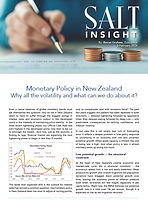INSIGHT REPORTS
INSIGHT
3 December 2025
Bevan Graham
The Fed is facing a tough call when it meets next week for the final time this year. Markets have the probability of a 25bp cut at 85%. The reality is the decision will be a lot closer. Ultimately the decision will come down to the Fed’s collective judgement on asymmetric risks - protecting the labour market if policy is now too tight, versus protecting price stability if disinflation is incomplete.
INSIGHT
19 November 2025
Bevan Graham
When the Reserve Bank of New Zealand front-loaded its 50bp cut in October, it signalled that more easing was likely. Taking that guidance at face value, a further 25bp cut next week looks the path of least resistance, accompanied by a dovish signal that the door remains open to additional easing if required. However, the hurdle for further easing beyond that is high. Additional cuts become likely only if the tentative signs of recovery falter.
INSIGHT
25 September 2025
Bevan Graham
After the disappointment of the June quarter GDP result, the good news is green shoots are starting to emerge as data for the second half of the year starts to come in. Amongst all the data noise, the job for Government is to become far more focused on improving our perennially moribund productivity performance.
INSIGHT
15 August 2025
Bevan Graham
As we head into next week’s Reserve Bank of New Zealand (RBNZ) August Monetary Policy Statement, the key question is how much lower interest rates will need to go to stimulate demand. At the same time however, it’s worth remembering that low interest rates aren’t a panacea for all that ails us, as they simply mask and potentially delay attention to our deeper economic challenges.
QUARTERLY CHARTBOOK
May 2025
Bevan Graham
We have been expecting a recovery to emerge in the second half of the year, primarily driven by lower interest rates feeding through into household disposable income. Recent developments in the global trade environment challenge that assumption. For now, we have trimmed our GDP forecasts on the basis of lower global growth. The outlook is highly uncertain.
INSIGHT
6 March 2025
Bevan Graham
The uncertainty of US tariff policy is morphing into a hard, cold reality. Weakness in the “soft” sentiment data will soon become weakness in the “hard” activity data. On inflation, the Fed needs to be alert to the risk of renewed persistent inflation if consumers loss of purchasing power leads to higher wage demands in a tight labour market.
INSIGHT
14 November 2024
Bevan Graham
Events currently unfolding in France show how difficult it is for politicians to shift unsustainable fiscal settings back onto a sustainable trajectory. At the same time, the ECB is warning of the possibility of another Euro zone debt crisis, akin to that in the early 2010’s. They warn that complacency is not an option. Bond investors should remain vigilant.
QUARTERLY CHARTBOOK
August 2024
Bevan Graham
The New Zealand economy continues to struggle. While the economy managed to eke out a modest GDP increase in the March quarter, more recent partial data has been weaker. We expect to see contractions in activity in both the June and September quarters before stabilising.
INSIGHT
26 June 2024
Greg McMaster & Greg Fleming
Recent months’ furious rally in a small group of Artificial Intelligence (AI)-themed companies raises questions about how to preserve prudent diversification. Equity market index performance is ever-more influenced by a few Mega-Capitalization Technology enterprises. We consider what that means for portfolio construction choices.
INSIGHT
24 November 2025
Bevan Graham
Throughout the developed world there is increasing focus on the politically fraught issue of fiscal sustainability. This week the UK Chancellor will bring down a Budget that attempts the classic fiscal triad of maintaining fiscal credibility, supporting growth and the preservation of political capital.
INSIGHT
5 September 2025
Bevan Graham
Yield curves across the developed world are steepening, with long-term rates rising relative to the front end. This is not merely cyclical noise: it reflects a structural re-pricing of risk in global capital markets. New Zealand's fiscal credibility provides resilience but for a small open economy, resilience is not immunity from global forces.
INSIGHT
24 June 2024
Bevan Graham
For many developed economies persistent fiscal deficits have become a structural problem and the pathway to fiscal sustainability is becoming increasingly challenging. There are no easy choices, but a head in the sand approach will just make the problem bigger and more disruptive to solve when action becomes urgent.


























